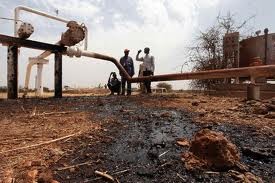The US, UN Security Council and African Union have condemned the latest escalation of violence between Sudan and South Sudan in border areas on both sides.
The South Sudanese government accused the Sudanese air force (SAF) of bombing its oil rich Unity state on Monday and Tuesday this week.
‘Sudan dropped at least three bombs near oil fields in the town of Bentiu, however the extent of the damage is not immediately known’ said Unity State Minister of Information Gideon Gatpan.
Meanwhile the Sudanese government accused South Sudan of attacking Heglig oil fields north of the border ‘reflecting extreme hatred for Sudan’, said Abdullah Ali Massar, the information minister to the government owned news agency SUNA.
Clashes were also reported in the disputed border town of Jau, claimed by both sides.
Timing of clashes
Some commentators have speculated on the timing of the clashes pointing to Khartoum’s cancellation of Al Bashir’s trip to Juba on April 3 to discuss the outstanding issues between the two countries following the secession of the South.
Over the past couple of weeks South Sudanese civil society groups and some government officials have called for the arrest of Sudanese president Bashir when he arrives in Juba for the summit.
President Bashir is wanted by the international criminal court for crimes against humanity, suspected genocide and war crimes committed against civilians in Darfur.
The Sudanese government had demanded ‘guarantees’ from Juba that he would not be arrested.
‘Disproportionate force’
US secretary of state Hillary Clinton blamed the Sudanese government for the latest clashes.
‘The weight of the responsibility rests of Khartoum’, said Clinton to reporters in Washington. She added that there was evidence of ‘disproportionate force’.
US officials fear all-out war between the two sides if they don’t return seriously to the negotiating table.
The US helped to broker the ‘Comprehensive Peace Agreement’ in 2005 that ended the long civil war and cost over two million lives.
‘Deep concern’
The UN security council expressed ‘deep concern’ about the clashes warning that fighting could ‘re-ignite the war between the two sides and harm the humanitarian situation in both countries.
In a statement, UNSC president Mark Lyall-Grant called for Khartoum and Juba to ‘exert the highest restraint’ and preserve the peace process and negotiations to help them settle contentious issues including the administration of Abyei, citizenship, border demarcation and oil.
‘Withdraw forces’
On Wednesday the African Union (AU) demanded that Khartoum and Juba withdraw their forces 10 km back from the border to ease the tensions between them, as stipulated in an agreement signed by both sides.
In a statement Jean Ping president of the AU commission expressed ‘serious concern about the latest escalation on the border between Sudan and South Sudan.’




